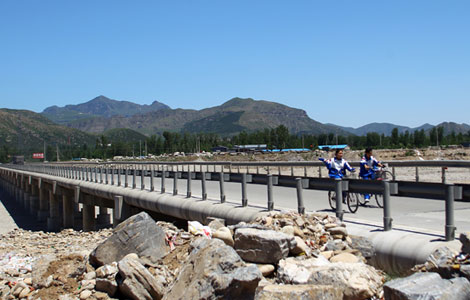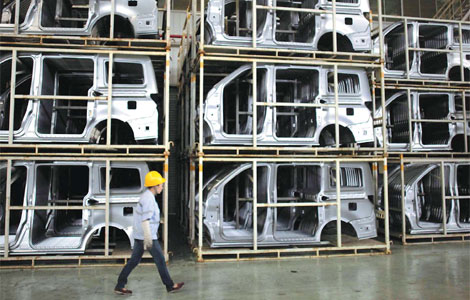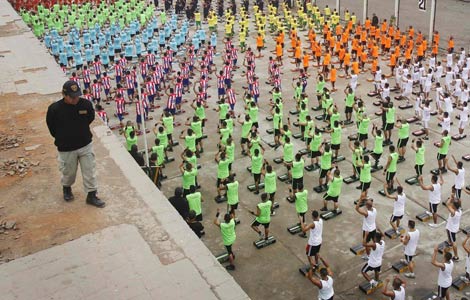Brazilian cities revoke fare hikes
Updated: 2013-06-20 08:06
(Agencies)
|
|||||||||||
SAO PAULO/FORTALEZA, Brazil June 19 -- Brazil's two biggest cities agreed on Wednesday to revoke an increase in public transportation fares that set off demonstrations that have grown into nationwide protests against poor public services, inflation and corruption.
The decisions, made separately in Sao Paulo and Rio de Janeiro, followed another day of protests across Brazil, which also included a march by demonstrators around a major international soccer game in the northeastern city of Fortaleza.
This month's transport fare hikes, which came as Brazil struggles with annual inflation of 6.5 percent, stirred a groundswell of other complaints, leading to the biggest protests to sweep Brazil in more than two decades. The protests have been organized by a disparate group of activists who have rallied supporters via social media.
Sao Paulo state Governor Geraldo Alckmin, announcing a reduction in fares to their level before the hike, called it "important ... so the city can have the tranquility needed to debate issues calmly."
It remains unclear whether revoking the fare increases, which followed similar fare cuts in other state capitals, will be enough to quell the unrest. Initially focused in cities like Sao Paulo, Rio and Brasilia, demonstrations have spread, with protests planned in more than 70 smaller cities for Thursday.
After the fare increase was scrapped, leaders of the protest movement in Sao Paulo said their cause would now shift to free public transport and that a planned protest for Thursday would be a celebration.
President Dilma Rousseff, a former leftist guerrilla who was imprisoned and tortured by Brazil's former military dictatorship as a youth, acknowledged on Tuesday the legitimacy of the protesters' demands.
Her Workers' Party presided over a near decade-long economic boom that lifted more than 30 million people from poverty. But a recent slowdown is prompting many among Brazil's growing middle class to demand more of the government.
She praised the mostly non-violent demonstrators and said her government would seek to improve schools, hospitals, infrastructure and other public facilities and services.
FEDERAL TROOPS DEPLOYED
To help maintain order, Rousseff dispatched federal troops to five cities hosting games during the Confederations Cup, an international soccer tournament that began earlier this month. The competition is a warm-up for the 2014 World Cup, a much bigger tournament that Brazil will also host.
The deployment, part of the contingency plan for the Confederations Cup, is similar to the previous use of federal troops when crime, violence or other unrest disrupted annual Carnival celebrations and other big events.
In Fortaleza, where Brazil beat Mexico on Wednesday in a Confederations Cup game, protesters crossed police lines and were pushed back by security forces with teargas, rubber bullets and pepper spray. Inside the stadium, Brazilian fans showed support for the demonstrations, singing well past the end of the national anthem and waving banners in solidarity.
Contrasting the country's high taxes with its ramshackle schools, hospitals and other shabby government services, demonstrators have criticized the 28 billion reais ($12.9 billion) of public money being spent on the World Cup, to be played in 12 Brazilian cities.
The demonstrations surrounding Wednesday's game began well before kickoff. Protesters marched toward the stadium and carried banners asking residents to "hit the street" and demanding "health, education, not corruption."
In Sao Paulo, the site of the most frequent marches until now, protests further complicated the daily commute for many of the residents of Brazil's financial and industrial hub. Demonstrations have so disrupted the already gridlocked city that many companies have allowed employees to leave early in recent days or allowed them to work from home.
Wednesday's marches followed overnight demonstrations in the city that led to looting and vandalism. Police arrested more than 63 people after protesters torched a police facility, tried to storm City Hall and broke windows and ransacked stores.
FARE CUTS MAY NOT BE ENOUGH
So far, neither Rousseff's bid to embrace the protests nor previous transport fare reductions in other cities have done much to stop the unrest, in part because of the diffuse nature of the protesters and the wide array of demands.
"It's difficult to get ahead of the movement because there isn't a clear image of who they are or what exactly they will do," said David Fleischer, a political scientist at the University of Brasilia. "It's hard to have a discourse with someone you don't know."
Although many Brazilians support the issues raised by the protesters, some are concerned about the vandalism and scattered violence that have accompanied some of the demonstrations.
In central Sao Paulo early on Wednesday, broken glass and other debris were scattered atop colonial cobblestones, and graffiti was scrawled on the front of the city hall. "The people have awoken," read one of the messages, echoing one of many chants that protesters have been yelling as they march.
"People are going to pay for this out of their pockets," said Manuel Carlos, a 42-year-old logistics manager. "I am in favor of the movement, but the stuff we are seeing here is absurd.
Related Stories
Rousseff praises Brazil protests 2013-06-19 07:20
Today's Top News
Xi meets UN chief
Talks establish fishery hotline
Cautious monetary stance to remain
Foreign buyers eye Chinese drones
City plan will grant migrants benefits
Yao looks to PwC for charity credibility
Space lesson to reach millions
A lost soul in a time of turmoil
Hot Topics
Lunar probe , China growth forecasts, Emission rules get tougher, China seen through 'colored lens', International board,
Editor's Picks

|

|

|

|

|

|





